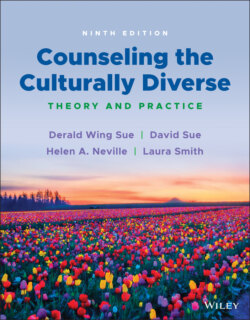Читать книгу Counseling the Culturally Diverse - Laura Smith L. - Страница 41
CULTURE‐UNIVERSAL (ETIC) VERSUS CULTURE‐SPECIFIC (EMIC) FORMULATIONS
ОглавлениеFirst and foremost, it is important to note that Dr. D. is well‐intentioned, but like many helping professionals he is culture‐bound and adheres to EuroAmerican assumptions and values that encapsulate and prevent him from seeing beyond his Western therapeutic training (Desai, Paranamana et al., 2021). One of the primary issues raised in this case relates to the etic (culturally universal) versus emic (culturally specific) perspectives in psychology and mental health. Dr. D. operates from the former position. His training has taught him that disorders such as panic attacks, depression, schizophrenia, and sociopathic behaviors appear in all cultures and societies; that minimal modification in their diagnosis and treatment is required; and that Western concepts of normality and abnormality can be considered universal and equally applicable across cultures (Arnett, 2009; Suzuki, Kugler, & Aguiar, 2005; Thalmayer, Toscanelli, & Arnett, 2021). Many culturally responsive psychologists, however, operate from an emic position and challenge these assumptions. In Gabriella's case, they argue that lifestyles, cultural values, and worldviews affect the expression and determination of behavior disorders (Ponterotto, Utsey, & Pedersen, 2006). They stress that all theories of human development arise within a cultural context and that using the EuroAmerican values of normality and abnormality may be culture‐bound and biased (Locke & Bailey, 2014). From this case, we offer five tentative cultural/clinical observations that may help Dr. D. in his work with Gabriella.
